We’re drowning in plastic! Top tips for using less
We recently returned from a three-week journey in Florida, U.S., traveling almost two-thousand miles around the state, visiting big and small cities, little towns and, of course, beaches.  And everywhere was plastic, from plastic bags at every grocery store to plastic-wrapped sandwiches and double-wrapped salads (plastic bowls surrounded by plastic wrap,” to individually-plastic-wrapped plastic utensils at the hotels where we stayed — none of the hotels recycled plastic, let alone the plastic bottles of water they provided gratis in the room. And let’s not even talk about aluminum cans or glass bottles.
And everywhere was plastic, from plastic bags at every grocery store to plastic-wrapped sandwiches and double-wrapped salads (plastic bowls surrounded by plastic wrap,” to individually-plastic-wrapped plastic utensils at the hotels where we stayed — none of the hotels recycled plastic, let alone the plastic bottles of water they provided gratis in the room. And let’s not even talk about aluminum cans or glass bottles.
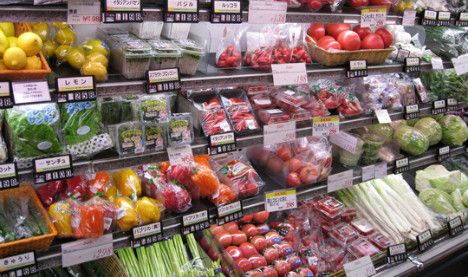
Too much plastic in supermarkets.
The only place we saw recycling bins were at the Publix supermarkets we visited. And once at Whole Foods in Tarpon Springs, where they actually had cardboard boxes instead of plastic containers at the salad bars.
Living in Cuenca, we make a conscious effort to reuse or just not use plastic if we can help it. We bring our own backpacks to the markets and when the vendors try to put products into a plastic bag we just show them our own and they are happy not use theirs. If we shop at a supermarket, we bring our own bags. We don’t buy individual bottles of water and try to remember to bring to-go containers when we go out to eat. We bring glass bottles to the recycling bins on Presidente Borrero y Calle Larga or in Parque de la Madre. I know we can do much more.
According to the U.N. Environment, “While plastic has many valuable uses, we have become addicted to single-use or disposable plastic — with severe environmental consequences. Around the world, one million plastic drinking bottles are purchased every minute, while up to 5 trillion single-use plastic bags are used worldwide every year. In total, half of all plastic produced is designed to be used only once — and then thrown away. Plastic waste is now so ubiquitous in the natural environment that scientists have even suggested it could serve as a geological indicator of the Anthropocene era.”
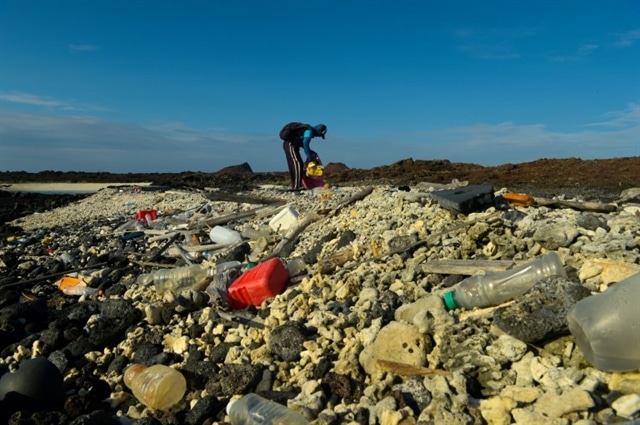
Plastic waste in the Galapagos Islands
Statita.com quotes The Wall Street Journal and reports in 2010; 8.8 million metric tons of mismanaged plastic wasted came from China with an estimated 3.53 million metric tons ending up in the ocean. China and Indonesia are the top offenders — “Together both nations account for more than a third of the plastic detritus in global waters.” The United States, while down on the list from Asian and Oceania countries including the Philippines and Vietnam, still contributed approximately 0.11 million metric tons of waterborne plastic garbage. GlobalCitizen.org reports that while the United States accounts for only four percent of the global population, 500 million plastic straws are used and discarded daily.
The average supermarket plastic bag can take up to 100 years to break down, but some countries and cities around the world have made “serious strides in the race against plastic,” such as Kenya, who since August 2017, has made fines or jail time mandatory for those found using, producing, or selling plastic bags. Vanuatu in the Pacific is the first Pacific country to phase out all plastic bags and bottles; as of April 2020, the United Kingdom will ban all plastic straws, stirrers and cotton buds. The U.K. has had a tax on plastic bags since 2015, which has resulted in 9 billion fewer plastic bags in circulation. The Guardian reports that the European Parliament voted to ban single-use plastics by 2021. Canada just announced that beginning in 2021 all single-use plastics “from coast to coast” will be banned.
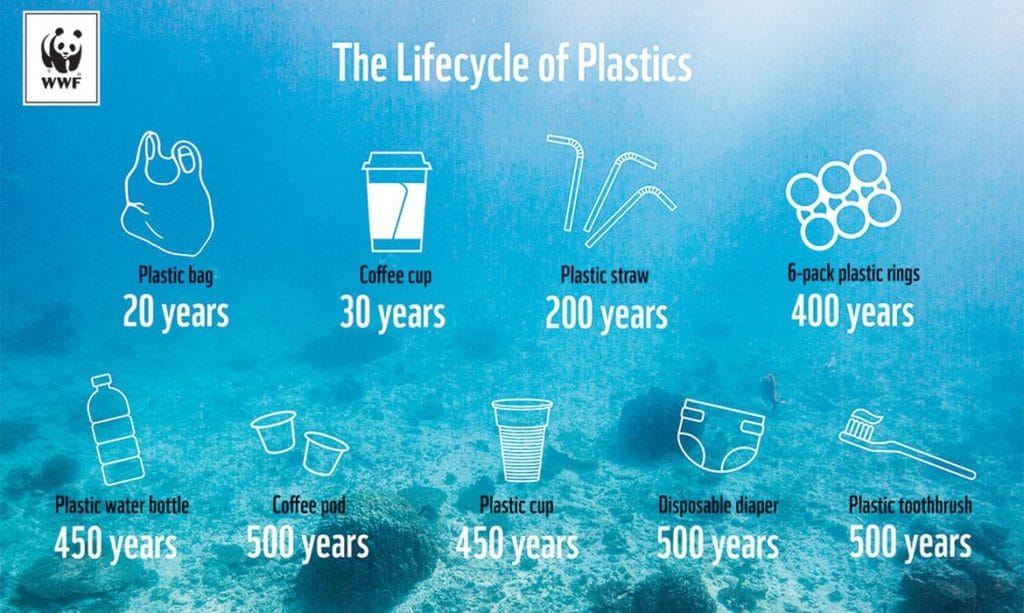
The United States is not united in a ban against single-use plastics. ReuseThisBag.com has taken a ‘big-picture look’ at where top-down legislation has been passed in the US, and additionally where plastic bags are banned around the world. In the U.S., only two states, California and Hawaii have banned plastic bags on a statewide level. Four states, Delaware, Maine, Rhode Island, and New York, have mandatory recycling or reuse programs in place. Read more here.
Globally, plastic bags are banned in 32 countries – 18 are in Africa. And although China adopted a full ban on plastic bags in 2008 and it appears that plastic wasted has “dropped by 60 to 80 percent — an effective reduction of some 40 billion bags, ReuseThisBag reports that the country faces “enforcement issues.”
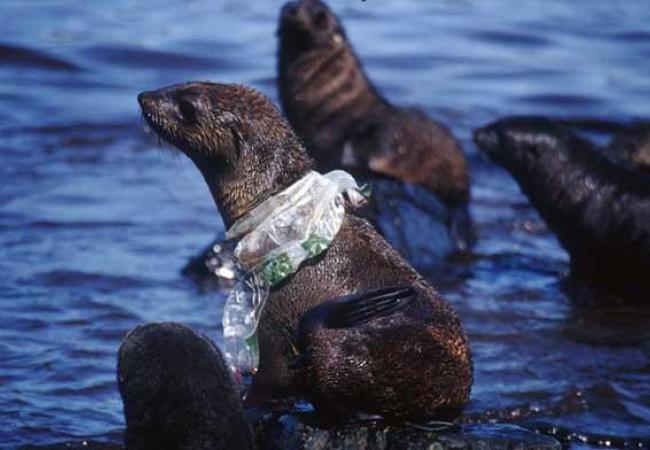
And although Ecuador’s Galapagos Governing Council announced a ban on all single-use plastics: straws and plastic bags, starting in the summer of 2018, the rest of the country does not legislate plastic yet, although Bloomberg Environment reported that in May of this year the mayors of Cuenca, Quito, and Guayaquil met to “start planning new waste management policies and practices.” A more recent development reported in CuencaHighLife.com June 17, 2019, “Cuenca Councilmen Cristian Zamora and Andrés Ugalde are developing legislation to regulate and reduce the use of plastic in Cuenca. A draft of the proposal was sent to the council’s Environment Commission and the mayor’s office last week.”
According to the Green Education Foundation, 30 million tons of plastic waste was generated in 2009, but only seven percent was recovered for recycling.
Here are their Top Tips to use less Plastic
- Stop using plastic straws, even in restaurants. If a straw is a must, purchase a reusable stainless steel or glass straw
- Use a reusable produce bag. A single plastic bag can take 1,000 years to degrade. Purchase or make your own reusable produce bag and be sure to wash them often!
- Give up gum. Gum is made of a synthetic rubber, aka plastic.
- Buy boxes instead of bottles. Often, products like laundry detergent come in cardboard, which is more easily recycled than plastic.
- Purchase food, like cereal, pasta, and rice from bulk bins and fill a reusable bag or container. You save money and unnecessary packaging.
- Reuse containers for storing leftovers or shopping in bulk.
- Use a reusable bottle or mug for your beverages, even when ordering from a to-go shop
- Bring your own container for take-out or your restaurant doggy bag since many restaurants use Styrofoam.
- Use matches instead of disposable plastic lighters or invest in a refillable metal lighter.
- Avoid buying frozen foods because their packaging is mostly plastic. Even those that appear to be cardboard are coated in a thin layer of plastic. Plus you’ll be eating fewer processed foods!
- Don’t use plastic ware at home and be sure to request restaurants do not pack them in your take-out box.
- Ask your local grocer to take your plastic containers (for berries, tomatoes, etc.) back. If you shop at a farmers market they can refill it for you.
- The EPA estimates that 7.6 billion pounds of disposable diapers are discarded in the US each year. Use cloth diapers to reduce your baby’s carbon footprint and save money.
- Make freshly squeezed juice or eat fruit instead of buying juice in plastic bottles. It’s healthier and better for the environment.
- Make your own cleaning products that will be less toxic and eliminate the need for multiple plastic bottles of cleaner.
- Pack your lunch in reusable containers and bags. Also, opt for fresh fruits and veggies and bulk items instead of products that come in single serving cups.
- Use a razor with replaceable blades instead of a disposable razor
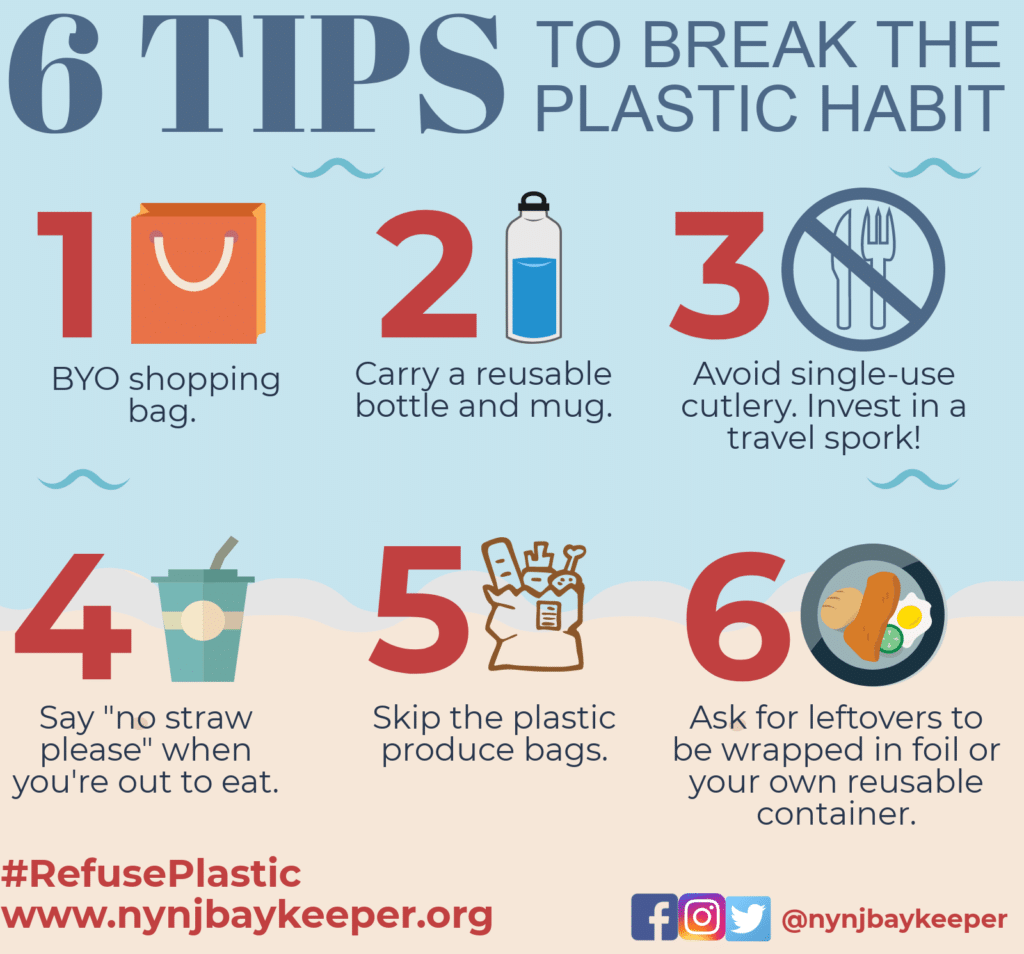
Start with these six tips.
Sources:
Bloomberg Environment. Ecuador considers legislation to ban single-use plastic. CNN.com. The final straw: England bans plastic items from April 2020.
GlobalCitizen.org. 16 times countries and cities have banned single-use plastics.
Green Education Foundation. Tips to use less plastic.
ReuseThisBag.com. Where are plastic bags banned around the world?
Statista.com. The countries polluting the oceans the most.
The Guardian. European parliament votes to ban single-use plastics.
UN Environment. Latin America and the Caribbean bids good-bye to plastic bags.
UN Environment. Our planet is drowning in plastic pollution.
_____________________
Susan Burke March is a Registered Dietitian Nutritionist and a Certified Diabetes Educator who specializes in smart solutions for weight loss and diabetes-related weight management, and a Cuenca expat. Contact her at SusantheDietitian@gmail.com

















